
Ithaca is a city and the county seat of Tompkins County, New York, United States. Situated on the southern shore of Cayuga Lake in the Finger Lakes region of New York, Ithaca is the largest community in the Ithaca metropolitan statistical area. It is named after the Greek island of Ithaca.

Sir Thomas Henry Hall Caine, usually known as Hall Caine, was a British novelist, dramatist, short story writer, poet and critic of the late nineteenth and early twentieth century. Caine's popularity during his lifetime was unprecedented. He wrote fifteen novels on subjects of adultery, divorce, domestic violence, illegitimacy, infanticide, religious bigotry and women's rights, became an international literary celebrity, and sold a total of ten million books. Caine was the most highly paid novelist of his day. The Eternal City is the first novel to have sold over a million copies worldwide. In addition to his books, Caine is the author of more than a dozen plays and was one of the most commercially successful dramatists of his time; many were West End and Broadway productions. Caine adapted seven of his novels for the stage. He collaborated with leading actors and managers, including Wilson Barrett, Viola Allen, Herbert Beerbohm Tree, Louis Napoleon Parker, Mrs Patrick Campbell, George Alexander, and Arthur Collins. Most of Caine's novels were adapted into silent black and white films. A. E. Coleby's 1923 18,454 feet, nineteen-reel film The Prodigal Son became the longest commercially made British film. Alfred Hitchcock's 1929 film The Manxman, is Hitchcock's last silent film.

Alonzo Barton Cornell was a New York politician and businessman who was the 27th Governor of New York from 1880 to 1882.

Stewart Park is a municipal park operated by the City of Ithaca, New York on the southern end of Cayuga Lake, the largest of New York's Finger Lakes.
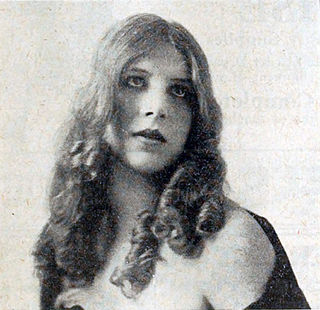
Valda Valkyrien was a Danish silent film actress.

Willard Dickerman Straight was an American investment banker, publisher, reporter, diplomat and by marriage, a member of the very wealthy Whitney family. He was a promoter of Chinese arts and investments, and a major supporter of liberal causes.

Wharton, Inc. was an early silent film production company in Ithaca, New York, from 1914 to 1919. One of the first independent regional centers of early filmmaking, the movie studio was established by brothers Theodore and Leopold Wharton on the shores of Cayuga Lake at the site of what is now Stewart Park. Currently, efforts are underway to create a silent movie museum in the former Wharton movie studio building in Stewart Park.

Llenroc is a Gothic revival villa built for Ezra Cornell, the founder of Cornell University. It is located at 100 Cornell Avenue in Ithaca, New York, United States, just below the Cornell University campus. Since 1911, it has been the home of the Pi Chapter of the Delta Phi fraternity.

Theodore Wharton (1875–1931) was an American film director, producer and writer. He directed 48 films in the 1910s and 1920s, including the 1915 The New Adventures of J. Rufus Wallingford featuring Oliver Hardy.
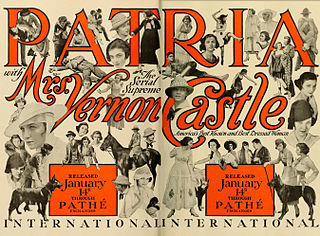
Patria is a 1917 15-chapter American serial film starring Irene Castle, Milton Sills, and Warner Oland, based on the novel The Last of the Fighting Channings by Louis Joseph Vance. Patria was an independent film serial funded by William Randolph Hearst in the lead-up to the United States' entry into World War I. The film in its original form contained anti-Japanese propaganda and was investigated by a Senate committee. The Argentine title for the film was La Heroina de Nueva York.
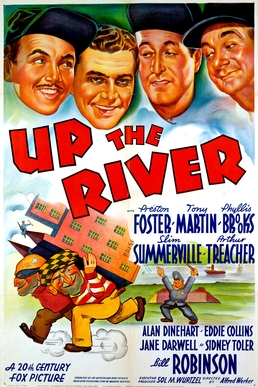
Up the River is a 1938 American prison comedy film directed by Alfred L. Werker and starring Preston Foster and Arthur Treacher and featuring Bill "Bojangles" Robinson. The film is a remake of a 1930 film with the same name directed by John Ford and starring Spencer Tracy and Humphrey Bogart in the roles subsequently played by Foster and Tony Martin. The remake changed the sport the plot revolves around from baseball to football.

Sir Derwent Hall Caine, 1st Baronet was a British actor, publisher and Labour then National Labour politician.

Beatrice Fairfax is an American silent film serial directed and produced by Leopold Wharton and Theodore Wharton. First released on August 7, 1916, the series consists of 15 weekly episodes and features the character of "Beatrice Fairfax". The character was inspired by the popular newspaper advice column Ask Beatrice Fairfax, which had been the world's first column of its kind when launched in 1898.

Strand Theatre was a historic theater located at Ithaca in Tompkins County, New York. It was built in 1916–1917 in the Tudor Revival style.
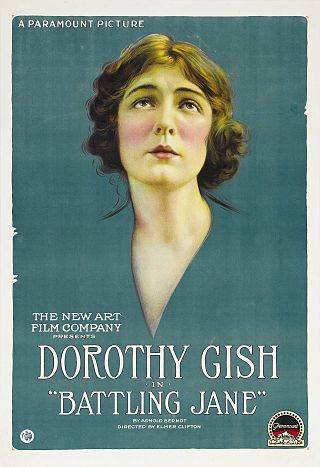
Battling Jane is a 1918 American silent comedy-drama film. It was directed by Elmer Clifton as a vehicle for Dorothy Gish and included some patriotic overtones. According to the Progressive Silent Film List at SilentEra.com, it is not known whether the film currently survives.
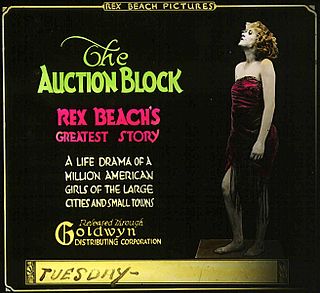
The Auction Block is a 1917 American silent drama film directed by Laurence Trimble and starring Rubye De Remer. The film was produced by Rex Beach, upon whose novel, The Auction Block, the film is based. It is not known whether the film survives. The film was remade as a comedy in 1926 by Metro-Goldwyn-Mayer starring Charles Ray and Eleanor Boardman.
The 1915 Cornell Big Red football team was an American football team that represented Cornell University as an independent during the 1915 college football season. In its fourth season under head coach Albert Sharpe, the Big Red compiled a 9–0 record, shut out four of nine opponents, and outscored all opponents by a total of 287 to 50. The 1915 team was known as The Big Red Machine, defeating every opponent by more than a touchdown.
Huns within our gates (1918) is a silent World War I propaganda film, starring Derwent Hall Caine and Valda Valkyrien. Produced by the Arrow Film Corporation, the cast, characters and plot were used in The Crusher (1917). After being re-edited the film was re-released as Commercial Pirates in March 1919. Also known as The Hearts of Men.

The Mysteries of Myra is a 1916 American silent film serial with episodes directed by Leopold and Theodore Wharton and starring Jean Sothern and Howard Estabrook. It was produced in Ithaca, New York by the Whartons and distributed by Pathé Exchange.

The Deemster is a 1917 American drama silent film, released by Arrow Film Corporation, directed by Howell Hansel, starring Derwent Hall Caine and Marian Swayne.


















